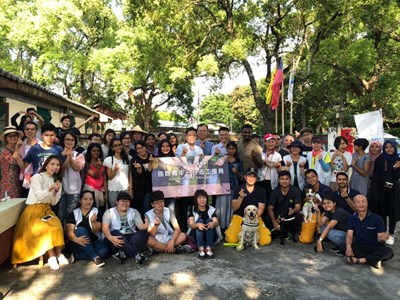2019-06-16
This is the first joint venture of its kind between Taichung City Government and National Chung Hsing University to create an innovative and meaningful exhibition of the tea industry with cultural elements. Director Lee has expected the Guan Fu Village to be oriented towards “social innovation,” “social enterprise,” and “social welfare policy research and development” ever since his assumption of office. He further hopes that the Guan Fu Village will become an indivisible part of the daily lives of the people.
Professor Mu-Min Chen, Director of the Office of International Affairs at National Chung Hsing University, mentioned that he spent several years studying the countries in South Asia. He found out that tea culture is a vital part of their daily lives. Black tea in Taiwan was introduced from Assam, India about one hundred years ago and it was used as the theme of the exhibition. Linking Taiwan, India and Sri Lanka by tea was a good idea.
The Department of Agronomy at National Chung Hsing University has spared no effort in the training of basic level and advanced level agronomists, and it has shared the plantation experience of the tea farmers of Taiwan with countries in South Asia through exchanges to help improve the local economies of these countries, said Professor Chen. The tea farmers of Taiwan have developed different new breeds of black tea over the years. Professor Chen hoped that through the joint promotion of tea as a form of soft power, Taiwan could be more visible in the world.
India and Sri Lanka are major black tea producing countries in the world, according to the Social Affairs Bureau. In this exhibition, the specific features of the tea plantation zones, tea picking and interactions with these countries will be brought to the people of Taiwan to make them aware of agronomy sustainable development, and to shed light on the problem of poverty in the backward countries.
In the tea party held yesterday, the “Hwa Gung Tea” of Taiwan offered its “Premium Tea Bag” for a charity sale and donated the proceeds from the sale to the “South Asia Watch in Taiwan” to encourage the NGO of Taiwan to commit further efforts in the study of and exchange with South Asia, to perform its corporate social responsibility, and to let the world see the beauty of Taiwan.
At the conclusion of the event, Director Lee encouraged the young volunteers from India, Sri Lanka, Indonesia and Taiwan, and thanked them for the service. They not only helped cultivate the plantation lands but also assisted the handicapped to tidy up the accommodations and clean up the environment. This is indeed a contribution to society.
![]() unit:綜合企劃科
unit:綜合企劃科







